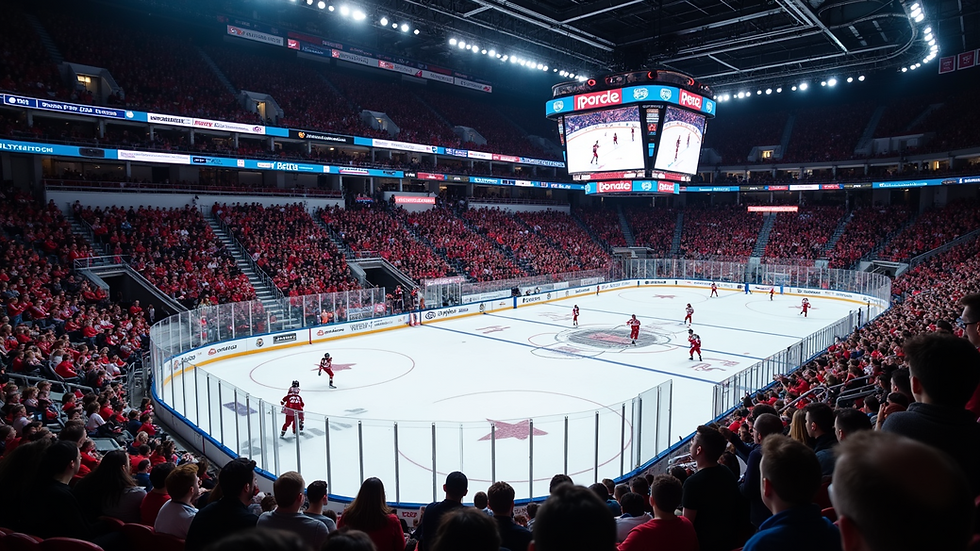Exploring Self Awareness and Mental Wellness for Hockey Players
- Mike Hartman

- Jul 23
- 3 min read
In the fast-paced world of hockey, where speed and skill dominate, mental wellness often gets overlooked. However, developing self-awareness is essential not just for personal growth but also for improved performance both on and off the ice. Self-awareness helps players understand their emotions, thoughts, and motivations, leading to better decision-making, stronger relationships with teammates, and greater resilience during tough situations.
By focusing on self-awareness, players can transform their game and overall experience in the sport. This blog post dives into the importance of self-awareness and its impact on mental wellness for hockey players.
The Link Between Self Awareness and Performance
Studies indicate that players who develop self-awareness are more likely to excel in their sport. For example, a 2021 survey found that 78% of athletes who practiced self-awareness reported feeling more in control during high-pressure situations. A player who recognizes their emotional triggers can manage anxiety effectively, leading to better performance.
Physical performance is affected by psychological factors. A self-aware athlete can quickly identify feelings of stress or distraction and apply strategies to counter them, such as mindfulness meditation or breathing exercises. These methods help maintain concentration and improve skill execution during games.
Additionally, self-aware athletes assess their performances objectively. Instead of attributing a loss to external circumstances, they reflect on their contributions and learn from mistakes. This mentality promotes a growth mindset, which is crucial for long-term success in hockey.
Strategies for Developing Self Awareness
Self-awareness is not just an inherent trait; it can be cultivated through practice. Here are a few effective strategies for hockey players to enhance their self-awareness:
1. Journaling
Journaling is one of the most effective methods for self-reflection. By writing about daily training sessions or games, players can express their thoughts and emotions. For instance, after a game, a player might jot down their feelings about their performance and identify areas for improvement. Over time, this practice reveals patterns in behavior, leading to better self-understanding.
2. Mindfulness Meditation
Mindfulness meditation enhances awareness of thoughts and feelings. Dedicating just ten minutes daily to this practice can train athletes to remain present, even in the heat of competition. A 2019 study found that athletes who practiced mindfulness improved their focus by 30%, allowing for more intentional and measured reactions during games.
3. Feedback from Peers and Coaches
Constructive feedback from teammates and coaches can shine light on blind spots. Regular, open dialogues about performance and mental states help build trust and strengthen team cohesion. For example, a player might learn from a coach that their body language affects team morale, prompting them to adjust their demeanor during games.
4. Goal Setting
Setting specific personal and team goals encourages athletes to reflect on their aspirations. Tracking progress toward these goals provides insight into motivations and triggers, enhancing self-awareness. Players who set clear, measurable goals—like improving their shooting percentage by 5% over a season—often report increased motivation and clarity in their performance.
5. Visualization Techniques
Visualization can significantly boost self-awareness. By imagining themselves succeeding in various scenarios, players can prepare mentally for challenges. Reflecting on their emotions during these visualizations reveals important insights about readiness and confidence levels.
The Importance of Mental Wellness
Mental wellness is equally as important as physical fitness in sports. Athletes who prioritize mental health can manage the pressures of competition, maintain strong relationships with teammates, and enjoy their sport more fully.
Mental wellness covers many aspects, including emotional stability, resilience, and overall psychological health. Athletes who neglect their mental well-being risk experiencing burnout, anxiety, or depression, all of which can detrimentally affect their performance.
To maintain mental health, players should engage in regular check-ins, employ coping strategies for stress, and seek professional help when needed. Statistics indicate that athletes who practice mental wellness techniques report a 50% decrease in stress-related issues.
Cultivating a Supportive Environment
For self-awareness and mental wellness to thrive, fostering a supportive team culture is essential. Coaches and teammates should promote discussions about mental well-being and support one another openly.
Creating a safe space for expression reduces the stigma surrounding mental health. Team-building activities focused on emotional health, like workshops or group discussions about challenges faced in hockey, promote unity and make players feel valued as individuals, not just athletes.
Final Thoughts
Self-awareness is a powerful tool for hockey players striving for peak performance and mental wellness. By embracing practices such as mindfulness, journaling, and open communication, athletes can elevate their game while leading healthier, more balanced lives.
Investing in self-awareness pays off with improved performance on the ice and enhances emotional resilience. As hockey evolves, recognizing the importance of nurturing both the mind and body of each player will pave the way for continued success and meaningful experiences in the sport.



